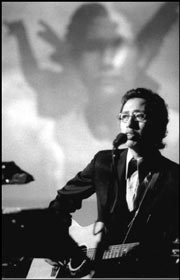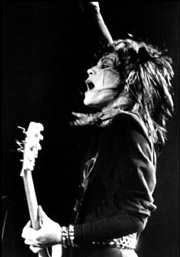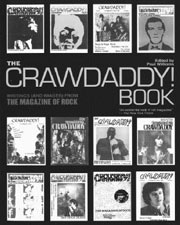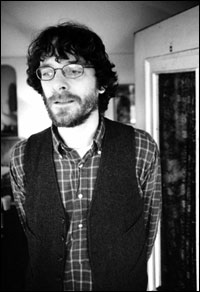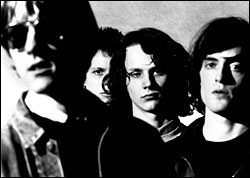ALEJANDRO ESCOVEDO
JESSIE SYKES AND THE SWEET HEREAFTER
Experience Music Project, Sky Church, 770-2702, $15
8 p.m. Sat., July 6
Rock ‘n’ roll means rejecting everything your parents stand for, right? Alejandro Escovedo, however, derives his satisfaction from probing those family ideals and values—good and bad—that helped shape him as a man.
By the Hand of the Father, the seventh album from the songwriter named No Depression’s “Artist of the Decade” for the ’90s, is the soundtrack to a theater production wherein Escovedo, along with cutting-edge L.A. company About Productions, examines through music and narrative the experiences of those Mexican-American men whose cultural heritage and hyphenated identity frequently left them caught between two worlds.
Calling from his home near Austin, Texas, Escovedo explains that the project’s germination came around the time of his 1996 album With These Hands. The title track, which featured guesting members of the musical Escovedo clan, dealt with border-crossing immigrants; Escovedo’s father was a first-generation Mexican-American. “So [then-publicist] Paula Batson and I were listening to the playback, and I had this idea to write a song cycle about my father’s life and present it to him as a 90th birthday present. That evolved into thinking of other ways how we could possibly stage it—dancing, film, videos, lighting—to make it into more like a theater work.”
With Batson stepping into the role of producer, Escovedo and About Productions’ playwrights Theresa Chavez, Eric Gutierrez, and Rose Portillo began shaping By the Hand of the Father. The writers drew from family stories, developing themes that reflected the lives of their immigrant fathers. Key to the project were Escovedo’s songs, whose Latino-draped folk rock and narrative detail would provide the play’s emotional core, with videos and a pair of actors extending the themes visually and verbally.
“I brought a lot of songs that I had written about my father, which in turn inspired certain narratives and text,” says Escovedo. “Then once [the playwrights] really started getting in and writing their own stories, I was inspired by some of those to write more songs.”
The elegant, complex BTHOTF premiered in L.A. in June 2000, going on to earn an Imagen Foundation Award nomination (for its contribution to the positive portrayal of Latinos in the arts). Just last week, the production had its Austin premiere and was taped for an episode of Austin City Limits; plans are to tour it extensively during 2003. Meanwhile, Escovedo’s Seattle performance will be a rare show featuring not his touring band but the play’s seven-piece musical ensemble: “We did the play in Seattle [in 2000], but this time we won’t have the aid of actors or visuals, so I’ll be talking about the story, the record, and the play as we’re presenting the songs.”
BTHOTF was, in a sense, destined to be made. Escovedo recalls a conversation he had in the ’80s while a member of cowpunk outfit Rank & File. “The father of my friends in Rank & File, a Marine, had this theory that people should really not complain that much, that we don’t have to continually tell our children what hardships we had. And I disagreed with that! I thought it important that we tell the stories, and we learn from mistakes and experiences that our parents have gone through. In fact, ‘Rain Won’t Help You When It’s Over,’ the first song I ever wrote, was about my father and about the border and the need to keep the culture alive by telling the stories, how we lose that.”
In a timely stroke, Escovedo’s first two solo albums, 1992’s Gravity and 1993’s Thirteen Years, were recently reissued by the Texas Music Group label as expanded two-disc editions. The latter, in particular, dwells at length upon what it means to be a man growing older and seeing relationship ties and commitments turn from joyous to fractured to tragic.
“In a way, what I was trying to do with Thirteen Years, actually, By the Hand wound up being,” muses Escovedo. “Records that you somehow see as you’re listening to them. So I think with the aid of narrative and little soundscapes on the record, you really can see a lot of what’s going on within the songs.
“My dad’s 96 now. When I first got By the Hand in, I took him the record, and he sat there and listened to it maybe four times in a row, I swear. He was really proud of the record, and I think it was something that he could not only relate to as stories but that there were Mexican songs on it, too. For him, it must have been like a soundtrack to his life.”
As a working musician who spends much of his time away from his own family, does Escovedo sometimes feel a bit like his father, torn between two worlds?
“All this music, all this traveling—it’s definitely taken its toll on my children. I’ve been divorced twice. Sometimes I look at my life and wonder if somehow it was worth it. Because I see fathers who drove home every night to be with their kids. At the same time, I have to think that the time I do spend with my kids and the things that I’ve given them—the exposure to different worlds and to a way of looking at things—it’s been a real gift, too, that not every father can give to their children.
“So it’s like you say: I’m kinda torn. But I’ve always said that the greatest moment for me is as the father: when I come back from a trip and all those kids are so happy to see me that they run up to me with their arms open. It’s just the greatest high around.”
info@seattleweekly.com 
